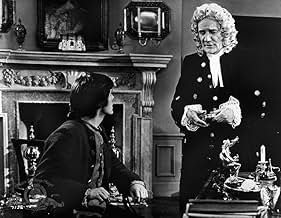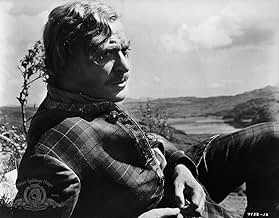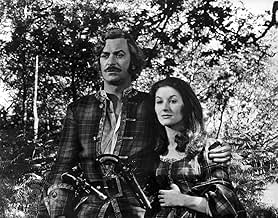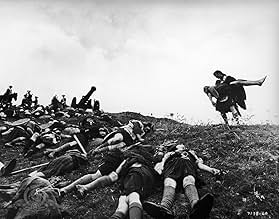Adicionar um enredo no seu idiomaIn eighteenth century Scotland, during the Jacobite Rebellion, David Balfour claims his inheritance from his uncle who has him shanghaied on a ship where David meets fugitive Jacobite rebel ... Ler tudoIn eighteenth century Scotland, during the Jacobite Rebellion, David Balfour claims his inheritance from his uncle who has him shanghaied on a ship where David meets fugitive Jacobite rebel Alan Breck.In eighteenth century Scotland, during the Jacobite Rebellion, David Balfour claims his inheritance from his uncle who has him shanghaied on a ship where David meets fugitive Jacobite rebel Alan Breck.
- Direção
- Roteiristas
- Artistas
- Direção
- Roteiristas
- Elenco e equipe completos
- Produção, bilheteria e muito mais no IMDbPro
Avaliações em destaque
I think there have been some unfair comments made on this particular interpretation but in general I would say it deserves a far better reception than some have given.
I have no problem with the English actors playing Scottish characters, Caine here is a passable lowland Scots as Allan Breck. Actors after all are judged by their skills and interpretation of the character and that's all that matters, it would be a sad day if we have to be Scottish solely to play a Scottish character. However, I'm not sure that Caine's costume would be one anyone would be seen dead in, it was clearly awful, and hardly the sort of attire a rebel would be running around in.
What matters is, that it is a fine interpretation of Stevenson's story.
Whatever the rights and wrongs (ethically speaking) of the breakup of the old clan system in the Scottish Highlands, and the claims of the Jacobite Succession, it is just plain wrong (factually speaking) to refer to the English as the "British" by contrast with the Scots. The term British refers to anyone who was a subject of the British Crown, subsequent to the Act of Union of 1707; it can refer indifferently to Scots, Welsh, English and Northern Irish, and historically (prior to Home Rule) to the Irish generally.
There may be some sentimentality on the part of American viewers who, mindful of their own War of Independence, wish to identify with others struggling against "British" rule. But the terms British and English are not, and should not be considered, interchangeable.
(There is great ignorance about this distinction in Continental Europe as well; I have had many animated discussions with German-speakers, who have failed to distinguish between "England" and "Grossbritannien", and with Francophones, who think that the whole of "Grande-Bretagne" is also "Angleterre". This may be politically comforting, but is culturally and historically WRONG!)
The first thing that stands out from the outset here is that the cockney actor Michael Caine is starring in the role of Alan Breck, the Jacobite rebel. It seems like it must be a bit of miscasting, as it is difficult imagining Caine in such a role, however, pleasingly he is very good here and his film star charisma is used to very good effect for this particular character. The film also benefits a lot from plenty of nice on-location photography from around Scotland. It gives the whole production more of an authentic feel. The story-line is compelling and the direction is well-paced, while the events depicted are less over-the-top than in later Scottish adventures set in historical times such as Braveheart (1995) and this for me is a good thing. The story-line eventually dove-tails to a very bittersweet ending that seems like the only appropriate way to round things off.
The film movingly portrays a culture and political cause on the verge of destruction and the politics behind it. To a certain extent, it has to modify the plot of the two novels to effectively do so. Now it might have been nice if we could have heard the Scottish language spoken amongst the Highlanders. This absence makes it harder to portray the cultural conflict which was important both in the period and in the novels. However, we can forgive the film's makers by remembering that such was rarely done in the early 1970s.
The plot may not be entirely accurate in detail (the Appin murder, etc), but the portrayal of the Jacobite Rebellion is both very accurate and insightful, surprisingly so for a big-time film. The ending is a terrific and original attempt to convey the thoughts and psychology of a man through the medium of film.
All that aside, it is a historical adventure. One either likes that genre or doesn't. If the former, then the chances are you will like this.
Você sabia?
- CuriosidadesSeveral books on Sir Michael Caine have alleged that the cast and crew were not paid because of cash problems. Caine admitted this in his 1992 autobiography "What's It All About?"
- Erros de gravaçãoCatriona in the getaway is wearing a blue/brown check tartan dress split up the front showing a white underskirt and a shawl. She's seen in this costume a couple of times as she, Alan Breck and David elude the redcoats but when they come across a looted cottage she's seen wearing a light brown bodice square cut across the chest and laced down the front. When they flee the cottage she's back in the tartan dress. Alan in the gateway has a belt, pistol and a long dagger. When he reaches the rear of the cottage he's also got a strap over his right shoulder to his left side with a scabard which he's lost when they leave the cottage.Alan and Catriona are given shelter by Cluny who tells his wife to give Catriona fresh clothes as her tartan dress is torn. The following morning she's seen in the tartan dress and Alan with the sword belt. The sequences have obviously been wrongly edited.
- Citações
Alan Breck: You should not be thinking of your father now, but Scotland. Scotland, lassie, do you know what that means?
- ConexõesFeatured in Dream Me Up Scotty! (2013)
Principais escolhas
- How long is Kidnapped?Fornecido pela Alexa

































